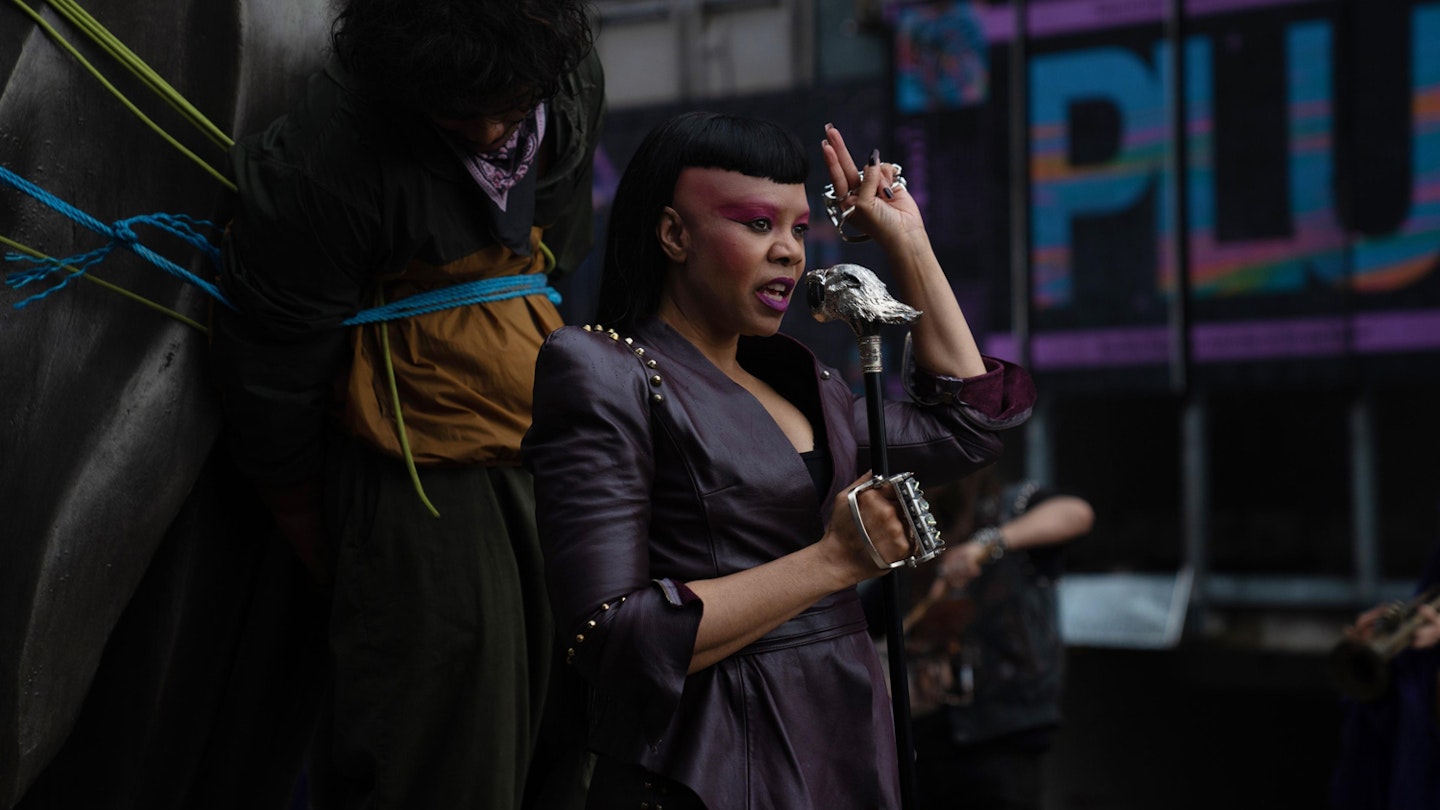To make an all-time-great album, you don’t play it safe. Ziggy Stardust, for instance, is a far-out space oddity. Modern masterworks like The ArchAndroid or Art Angels mash genres at will, inventing sounds you’ve never heard before. While Geremy Jasper’s original rock-opera movie musical O’Dessa fails in its attempt at greatness, it at least understands that grasping towards eternity means taking an almighty leap.

You’d be hard-pressed to say you’ve seen anything quite like O’Dessa before. Jasper’s long-awaited follow-up to Sundance favourite Patti Cake$ is a truly oddball brew – a banjo-twanging alt-universe odyssey through a gaudy, dystopian world, where psychedelic ooze (‘plazma’) bubbles under the soil and Murray Bartlett’s cult leader Plutonovich has enslaved the populus through mindless entertainment. Enter Sadie Sink’s O’Dessa, possibly the fabled ‘Seventh Son’, on a ramblin’ quest that’ll lead her to true love and musical liberation. Its world marries the neon fug of Blade Runner to the diesel-punk wasteland of Mad Max, and then covers it like a Tenacious D song. (There is much singing of “destiny”, and a belief in the one great rock tune that might save the world.)
In the film’s opening act, it all proves oddly captivating – the combination of Americana-isms, sci-fi world-building, and fingerpicked folk tunes is more harmonious than you’d expect. And Sink is in good voice in the film’s title role, stepping up as a lead now the end of Stranger Things draws nigh. (She has form in such musical fare too, having portrayed Taylor Swift’s analogue in the All Too Well short film.)
The film rambles in all the wrong ways, walking in circles.
It’s a shame, then, that O’Dessa’s good will dissipates in a meandering second half. Her romance with Kelvin Harrison Jr.’s fellow performer Euri Dervish (there’s a whole ‘Orpheus / Eurydice’ thing going on in the mix, too) is ostensibly the meat of the film but lacks chemistry, slowing things to a crawl. An unrecognisable Regina Hall is fun as nefarious enforcer Neon Dion, but the narrative threads that bring O’Dessa, Euri and Neon together feel ill-defined. For all the inventiveness, dystopian clichés begin to take over. Worst of all, the expansive world that O’Dessa creates early on suddenly start to feel incredibly small – we’re promised a ramblin’ journey, but the film rambles in all the wrong ways, walking in circles around Satylite City rather than keepin’ on down the road.
You suspect most of the attention was paid to the songs, since they’re largely very good – sometimes rootsy folk tunes, other times more full-blooded rock ’n’ roll numbers. When the film is in song, it comes alive; cinematographer Rina Yang brings energy to the lens, while the screen bursts into colour with an effervescence that feels lacking elsewhere.
Rather than rock ’n’ roll glory, O’Dessa feels more destined for cult-album status, especially to those enraptured by its soundtrack – it will inevitably find its fans. It’s the sort of head-scratcher you should stumble upon at midnight on Film4, and either switch off immediately, or find yourself strangely enraptured by; promisingly unique, with real vision in its best moments. But the overall vibe and the future-punk-yee-haw songs are better than the film itself – too much of a bum note to ignore.
